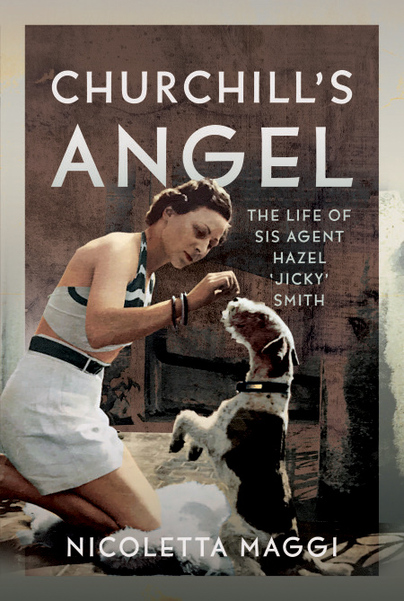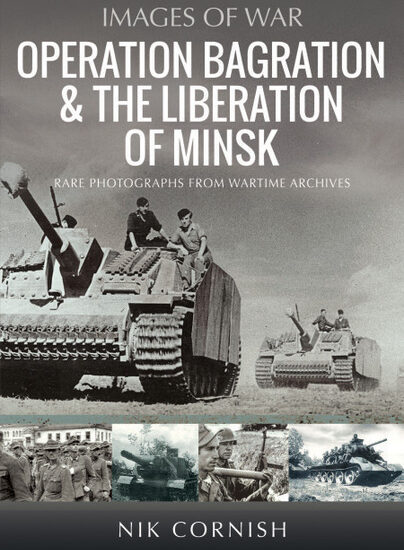Churchill’s Angel
Author guest post from Nicoletta Maggi.
This is a rare biography of a secret SIS (MI6) agent operating in France during the Second World War.
Not the story of a heroine but of an ordinary girl, full of dreams and hopes, who at a certain point in her life found herself facing a hellish war and did not back down. She decided to fight with all her determination, strength and ability, suffering torture by the Gestapo while she was in an advanced state of pregnancy, and eventually managing to save herself.
Known as Jicky (her real name was Hazel Smith), she was one of the few who survived capture, imprisonment and torture by the Nazis during the war.
Were she still alive, I could never have written this book. Or rather I could have talked about her private life immersed in culture and art, enriched by her travels and passions, and of course by her distinguished acquaintances – painters, writers and fashion designers among the most in vogue. She was fiercely proud of this.
Not a single line could have come out about her secret service activities. She would never have allowed it. She had signed the Official Secrets Act. She would be eternally loyal to her oath, even if her extreme devotion to duty later deprived her of commendations and official recognition. Confidentiality was the number one rule, as it is still today in MI6.
She was one of the British Secret Intelligence Service officers who worked at embassies and consulates, collecting and analysing military, economic and political intelligence to prepare reports for the Foreign Office. This intelligence was to guide the government and, in times of war, the War Office. Some were dropped by parachute or carried by speedboat, even by submarine.
This biography was written entirely after her death.
In this book you won’t find details of the torture she suffered. Her pain and humiliation as a woman were immense and overwhelmed her. She only recounted that she had been in the clutches of her German captors and would simply repeat this fragment of her life story every once in a while.
I describe many details of her private life, which I consider to be fundamental to an all-round understanding of the character of a woman who lived to the age of 97, with all her successes and downfalls – a strong woman who performed extraordinary tasks in MI6, and with her strength remained a loving and sensitive human being. A woman of many nuances and contrarieties, but one who never submitted to restraints or surrender.
Jicky only revealed her role in MI6 in her later years. I believe her biography is particularly relevant now, especially in this historic period of renewed wars around the world. She represents a role model, an example to follow. It is right to talk about people like her. At the Casa del Mutilato in Genoa, a home for war invalids, is written an inscription: ‘War is the lesson of history that people never remember enough.’ The lesson of Jicky’s life in this historical period stands out to be remembered and to be learned from.
The techniques used by the SIS (MI6) and the SOE during the Second World War are so modern even today.
Jicky was an expert graphologist. She could decipher the personality of people under observation from their handwriting and then reveal it to the investigators. She could analyse if someone was strong or corruptible – crucial information for the Foreign Office and Winston Churchill.
Some might mistakenly think that graphology is a pseudoscience, now in disuse. On the contrary, never before has there been such a revival: in the courts and even in the most sophisticated companies for personnel recruitment.
Another area in which Jicky was highly specialised was communication by carrier pigeons, the section known as MI14. She was also familiar with all the international laws protecting them. Carrier pigeons were very important over the centuries and in the two world wars.
I started researching my biography of Jicky after her death at the age of 97. Part of her life was spent in the Italian town of Sirolo, on the Conero Riviera, where she is buried, and in nearby Numana, where she ran an antique shop. I met Jicky as a student in this shop: she used to correct my English homework at first and then we became friends.
My recounting of Jicky’s life as a secret agent begins by diving into those dramatic days as a young woman, assigned to the British embassy in Paris as war was approaching. Her specialisation in graphology and its use by the MI6 is described, as well as her knowledge of carrier pigeon laws. This is followed by a description of her capture by the Nazis. We then move on to the rest of her fairytale life spent in comfort in France and her passionate life in Italy and the revelation of the details of her famous diaries. And finally, her death, practically alone.
The second part of the book delves into her involvement in the French resistance. Jicky was also active in De Gaulle’s Free French Resistance groups. This was the most challenging part of my research, spending years researching in the military archives of France in Vincennes and at the Free France Foundation. It was also very difficult to find traces of Jicky’s then partner, the resistance fighter with whom she had a son and who later started a new life in South America.
It was worth the effort. In the course of my investigation, I managed to find documents of other British girls operating in France, and some of the people Jicky spent time with during that period are also described here.
The third and final part of the book revolves around in-depth research into Jicky’s childhood in England, her family in Harpenden, her birth certificate, her beautiful home. My understanding of this place was strengthened by a trip to Jicky’s hometown – a place of beauty and mysteries.
This final part also reveals the stratagem used by Jicky to save herself from the Nazi clutches. It is a sensational fragment, a masterpiece of intuition, genius and sang froid. A masterful lesson in the art of survival, to be studied in textbooks.
Every single detail of her private life is a valuable and authentic element to understand the personality of a woman who didn’t conform to society’s schemes. Secret agents are people not so distant from us, just remember that, not the superheroes of the movies.
I don’t like to call Jicky a heroine. I believe she wouldn’t like it either. The French philosopher and politician Michel de Montaigne wrote: ‘So many heroes, so many idiots.’ For Jicky, Hitler and his regime just had to be stopped.
With this book I pay tribute to Jicky and her exemplary courage, possessed by those who are aware of danger, and strength. Above all, it is a tribute to her principles, her opposition to evil, and her dedication to honour and justice.
Jicky always remained a rebel in life, an independent and undisciplined lover of freedom.

Order your copy here.

